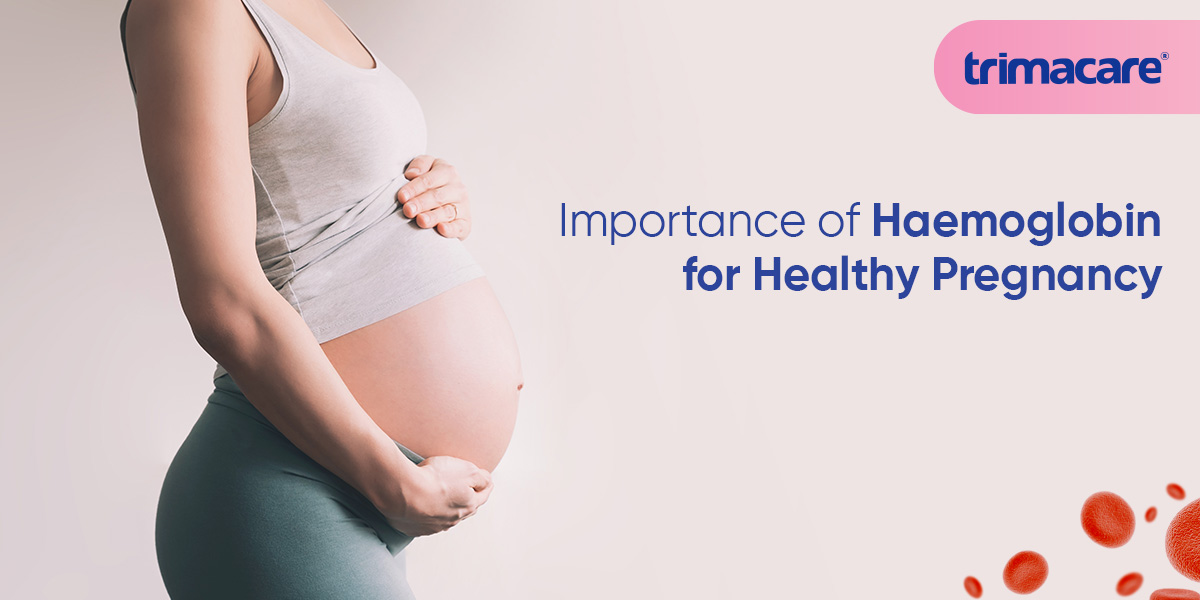Pregnancy is an important phase in a woman’s life that requires proper care and optimal nutrition. Along with essential nutrients, haemoglobin during pregnancy also plays a crucial role in ensuring the good health of the mother and baby. Haemoglobin is a protein in these cells that holds and transports oxygen to different tissues and organs. Maintaining a normal haemoglobin level during pregnancy is crucial for preventing complications and ensuring a smooth pregnancy journey.
Haemoglobin and Its Importance
Haemoglobin is a protein found in red blood cells. It supplies oxygen to different organs and tissues in the body. During pregnancy, the body experiences several physiological changes including an increase in blood volume by 50%. This means that the demand for haemoglobin during pregnancy also increases to meet the oxygen requirement of the mother and growing baby. A low haemoglobin level during pregnancy can cause dizziness, fatigue and shortness of breath. Moreover, it may also cause anaemia and pregnancy complications such as increased risk of preterm birth, low birth weight etc.
Normal Hb level during pregnancy
Doctors often conduct routine blood tests to check the haemoglobin level during pregnancy to ensure stays within the healthy range. The normal Hb level during pregnancy varies in different trimesters-
First trimester: 11.6 to 13. 9 g/dL
Second trimester:9.7 to 14.8 g/dL
Third trimester: 9.5 to 15 g/dL
Low haemoglobin levels are common due to increased blood volume, but if it falls below 11 g/dL, it is considered anaemia.
Low Haemoglobin and pregnancy complications
Pregnancy and low haemoglobin levels do not get along. But deficiency can lead to several health issues, including:
- Weakness and maternal fatigue – When a mother’s haemoglobin levels are low, her oxygen supply is reduced, making her feel exhausted and weak.
- Elevated Risk of Preterm Birth – Severe anaemia increases the possibility of preterm birth, which can cause developmental problems.
- Low birth weight- Infants born to anaemic mothers may have low birth weight which can impact their general well-being and immunity.
- Delayed foetal growth- Insufficient supply of oxygen due to low haemoglobin and pregnancy may hinder the baby’s growth in the womb.
- Postpartum complications- Mothers who have low haemoglobin levels are more prone to experience excessive blood loss and difficulties during pregnancy.
How to Maintain Healthy haemoglobin levels?
To prevent complications during pregnancy, it is essential to maintain a normal Hb level during pregnancy. Here are some iron-rich-
Iron-rich diet
- Legumes such as lentils, beans and chickpeas
- Fish, poultry, red meat
- Green leafy vegetables like fenugreek, spinach and kale
- Iron-fortified cereals and whole grains
- Dry fruits like figs, raisins and dates
Vitamin C for better absorption-
When combined with vitamin C, iron absorption improves. Include citrus fruits like lemons, strawberries and oranges in your diet to enhance iron absorption.
Folic Acid supplements-
Folic acid helps maintain a normal Hb level during pregnancy and is essential for the synthesis of red blood cells. Doctors often recommend prenatal supplements containing folic acid.
- Iron supplements- Doctors may recommend iron supplements to treat severe anaemia and increase haemoglobin levels during pregnancy. Always take them as directed by a doctor to prevent adverse effects including nausea and constipation.
- Avoid excessive consumption of tea and coffee- Refrain from drinking too much tea and coffee, which are high in caffeine, and prevent the absorption of iron. Pregnant women must limit their consumption and check haemoglobin levels during pregnancy.
Trimacare: Most preferred iron tablet for pregnancy
Trimacare pregnancy supplement with iron is developed by experienced doctors, nutritionists and pharmacologists following WHO and ICMR guidelines. Trimacare prenatal tablet has more than 20 nutrients essential for a child’s growth and overall well-being. By providing pregnant women, the nourishment they need, the Trimacare pregnancy vitamin supplement helps fight morning sickness, constipation and digestive issues.
Trimacare is the only multivitamin tablet in India that addresses trimester-wise pregnancy needs throughout the pregnancy. Trimacare 3 prenatal vitamin contains time-release iron that minimises bloating and reduces gastrointestinal discomforts that come with regular iron supplements. It also has a bowel regulator that manages constipation during pregnancy.
Conclusion
Maintaining a sufficient haemoglobin level during pregnancy is essential for the mother and baby’s health. A balanced diet, regular blood tests, and any necessary supplements help prevent anaemia and ensure a healthy pregnancy.
If you suffer from low haemoglobin and pregnancy problems, consult a doctor. Maintaining a normal Hb level throughout pregnancy will help ensure a healthy and safe delivery.
FAQs
1. What happens if I suffer from low haemoglobin during pregnancy?
The low haemoglobin and pregnancy complications may lead to preterm birth, dizziness, fatigue, increased chances of infections and low birth weight of the baby.
2. Can exercise help enhance haemoglobin levels during pregnancy?
Yes, mild exercises such as walking and prenatal yoga improve circulation. These exercises also increase oxygen supply and boost haemoglobin levels during pregnancy.
3. How does my haemoglobin level impact my delivery and labour?
Very low haemoglobin during pregnancy can cause excessive loss of blood during delivery and increase the risk of postpartum haemorrhage.
4. Can I enhance my haemoglobin level in the second trimester of pregnancy?
Yes, by consuming a nutritional-rich diet and taking pregnancy supplements prescribed by a doctor, you can manage your haemoglobin level during pregnancy.
A Certified Nutritionist with a rich healthcare background in health journalism, the author has immense experience in curating reader-friendly, engaging, and informative healthcare blogs to empower readers to make informed pregnancy-related decisions.











